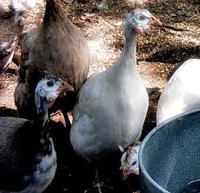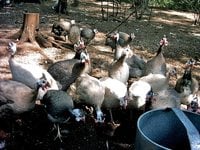General Information
- Breed Colors/Varieties
- Pearl, Lavender, White, Royal Purple, Coral Blue, Buff, Buff Dundotte, Chocolate, Porcelain, Opaline, Slate, Brown, Powder Blue, Violet, Bronze, Sky Blue, Pewter, Lite Lavender, and Pied (occurs in any color)
- Breed Size
- Large Fowl
Guineafowl, particularly the helmeted variety, have a long history of domestication. It is said they were domesticated in Africa more than four thousand years ago by ancient Egyptians. Ancient Greeks as well as Romans domesticated them as well as featuring them in their beautiful gardens and aviaries. They were later introduced into Europe but with the fall of the Roman Empire they appear to have been lost.
The ancestors of the guinea fowl we are so familiar with today were re-introduced to Europe during the fifteenth century and became popular in Britain and from there was taken by colonists and introduced to other parts of the world.
Flocks of guineas have been widely introduced into the West Indies, Brazil and southern France.
The ancestors of the guinea fowl we are so familiar with today were re-introduced to Europe during the fifteenth century and became popular in Britain and from there was taken by colonists and introduced to other parts of the world.
Flocks of guineas have been widely introduced into the West Indies, Brazil and southern France.




